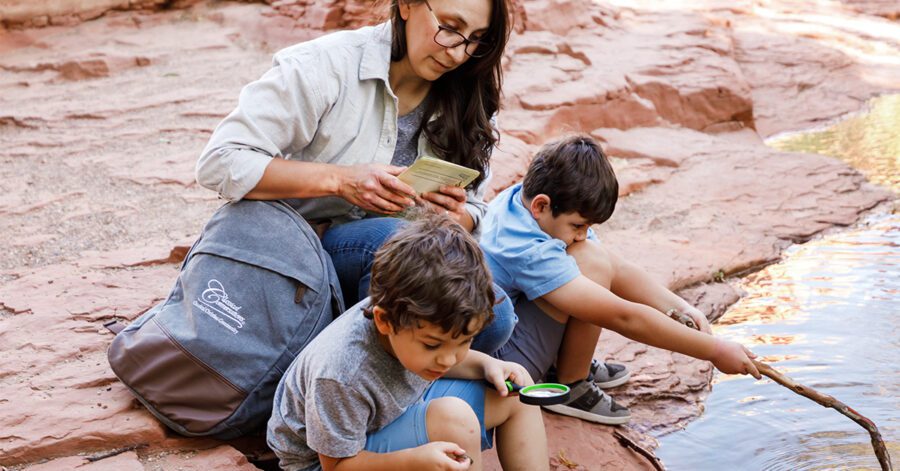“The only imperative that nature utters is, ‘Look. Listen. Attend.”
— C.S. Lewis
In a world of endless distractions and diminishing attention spans, cultivating the habit of attention-giving our full, undivided focus to something worthwhile—has become a lost art. Yet this practice remains essential not just for learning but for the enrichment of the soul itself.
Attending, rightly ordered, helps our children learn facts and develop virtue, self-control, and awe before their Creator. As one of the Five Core Habits of Grammar, attending allows the time and space to order the world around us and build a base of knowledge to support further inquiry.
Let’s turn our focus to attention and how we can develop the habit of attending not just in our homeschool but in every fabric of our lives.
What Is the Habit of Attention?
The word “attention” comes from the Latin attendere, which means “to stretch toward.” To attend is to give our full, undivided focus to something worthy of notice. This deep focus improves our recognition by helping us truly connect with the object of our attention while learning to filter out distractions.
But attention is not multitasking—true attending is singular and intentional. Our culture often celebrates doing more simultaneously, but the truth is that more is not better. More is simply more: more to filter out so we are able to focus singularly on a given experience.
We possess only a finite span of attention to give. The modern addiction to hyper-stimulation disrupts our nervous system and contributes to conditions like ADD and ADHD.
Unlike modern education, which often prioritizes measurable learning outcomes, classical education builds memory in a library of the mind, also known as memoria, to use later. This foundation of careful observation and comparison leads to better expressing and storytelling because students have built a rich mental repository of knowledge through attending.
In classical Christian education, attending isn’t just about academic success but spiritual formation. As Walker Percy said, “You can get all A’s and still flunk life.” [1] The classical model aims to train not just intelligent minds, but also encourages virtuous hearts. Therefore, the classical education attention span must be cultivated slowly and purposefully through habits that help children learn to look closely, listen carefully, and notice details with their whole selves.
Who Benefits from Attending?
Young Children excel at attending because they’re less distracted by peers or getting the “right” answer. They naturally absorb information from older students’ learning and conversations and are more apt to become engrossed in a new object or idea when given the opportunity.
Older Children often struggle with attending. Having become more test-driven, they might visit an art museum wanting to write down facts rather than attending to the details of a painting—the different types of strokes, colors, and feelings it evokes.
Adults perhaps need attending most of all. We miss so much because we’re over-familiar with the things we see. At one point, each of us was a toddler stopping to examine every colored rock on a walk or marveling at patterns of light dancing on a ceiling. Now we walk through the world without noticing the beauty and wonder we pass with every step.
Attending offers an opportunity to reclaim that childlike sense of wonder. What was lost between the bright-eyed curiosity of the child and the dulled, inattentive adult? How can we recover our ability to wonder while walking alongside our children?
When Do We Attend?
Attending goes hand in hand with Naming, another Core Habit of Grammar. We identify something and compare it by attending to its details. It’s essentially a compare-and-contrast exercise that enables students to see what something is and is not.
Let’s take learning about trees, for example. After naming certain terms like plant, tree, trunk, leaf, bark, pine, maple, and oak, we can practice attending by asking:
- What details do we notice about trees using our five senses?
- How are pines, maples, and oaks similar?
- How are they different?
- What makes a tree different from other plants?
Even young children attend naturally through classification questions:
- Who made the floor? A builder.
- Who made the dog? God.
Through such questions, children begin categorizing the world into man-made and God-made objects.
The habit of attending develops in each of the classical arts of the Trivium. For example, when studying tigers:
- Grammar: Students identify and categorize objects and ideas. Tigers have striped fur, four legs, big teeth, and claws. Tigers are like lions in shape but differ in color and habitat.
- Dialectic: Attending leads to asking deeper questions. Why do tigers like to swim? Do tigers have natural predators? Why is this tiger in the zoo?
- Rhetoric: Attending layers knowledge with purpose, morality, and advocacy. Is it ethical to keep tigers in zoos for human entertainment? Should we limit human encroachment on tiger habitats?
Where Can We Practice Attending?
Much learning happens in life’s “white space”—those unscheduled moments between formal lessons. A child’s natural state is to play, and through play, curiosity flourishes. Allow time for children to refuel their “attention battery” and decompress.
One way we practice attending in community at Classical Conversations is by listening to classical music pieces during the Fine Arts component of Foundations. How often do we take quality time to focus our attention and truly absorb a piece of music? We discover patterns when we attend to music, just as we do in science and mathematics.
A child who has learned to attend is better prepared to retain knowledge, make wise decisions, and develop deep relationships. In fact, the foundation for homeschool observation skills is laid not just during lesson time but in ordinary moments—walking outdoors, listening to a sibling, or noticing a pattern in music.
Discover all of the 15 Skills of Learning
Seven Focus Strategies for Homeschoolers
Here are a few practical, classical ways to grow focus in your homeschool:
1. Give Permission for Single-Tasking
Allow your child (and yourself) to focus on one task at a time. Slow the pace of the day to make space for focused observation. This discipline will improve over time as we train ourselves to stop multitasking and enjoy the freedom of focus.
2. Play Preschool Attention Games
Even the youngest learners benefit from simple games that build focus. Try “I Spy,” Simon Says, or matching games that develop the skill of attending with joy and play.
3. Ask Observational Questions
Instead of just telling your child what to notice, ask:
- What do you see?
- What do you hear?
- How is this different from that?
These open-ended prompts are foundational to teaching the habit of attending in any subject.
4. Engage the Five Senses
Whether you’re exploring a science experiment or baking bread, invite your child to describe what they see, hear, smell, feel, and taste. Observation becomes more memorable when it’s multi-sensory.
5. Eliminate Distractions
Create spaces and times free from electronic devices and other interruptions. Turn off background noise to encourage the singular focus of attention that will develop over time.
6. Model Attention
Children learn by watching us. Demonstrate focused attention in your own life, whether reading a book, listening to music, or observing nature. Attending is a “living habit,” not a “doing habit.”
7. Connect Attending to Wonder
Show respect for the value and nature of the object of our inspections and for its Maker. How can we make connections to the Lord and develop a culture of wonder and worship?
Attention teaches children how to ask good questions and how to sit with those questions. It builds a rich storehouse of mental images and connections that will later be used in writing, speaking, and reasoning. Simply put, the habit of attention strengthens both memory and morality.
The Scribblers at Home curriculum offers learning activities that focus on attending.
Why Attending Matters
Simone Weil, a philosopher, suggests that attention is a spiritual discipline that is the “substance of prayer.”[2] Indeed, attending is fundamentally spiritual. Scripture calls us to “take every thought captive” (2 Corinthians 10:5), which requires the ability to direct our attention.
God calls us to attend in various directions:
Inward: The reflective attention of searching our hearts and the hearts of our children. Like gardeners tending plants, we as parents must attend to and prune the parts that compete with Christ’s rightful place in the heart.
Outward: To attend to those around us with grace and patience, giving our full presence to whoever stands before us. Just as our Heavenly Father faithfully attends to us, we must model this by attending to others with love and compassion.
Backward: We attend to the past to understand the context of our lives. When we see the roots from which we come, we better understand our present purpose and gain wisdom from those who came before.
Forward: We attend to scraped knees and skip counting now to prepare our children’s hearts for the future. We plant seeds of learning in the hope that future generations will enjoy the fruit of wisdom.
Upward: Attending upward allows us to focus on God and His beauty, abundance, and sovereignty. When our attention is directed upward, we release control and pride, submitting with humility and peace.[3]
Homeschool observation skills form the foundation for curiosity and worship. When a child looks closely at a leaf, a star, or a verse of Scripture, they encounter not just information but wonder. This wonder becomes a form of worship.
Weil also identifies, “Attention is the rarest and purest form of generosity.” In a classical Christian homeschool, teaching children to attend is a way of directing their gaze toward beauty, truth, and ultimately God.
Teaching Attention Is Teaching to Love
The habit of attention—walking through our surroundings with open eyes—is not about rigid control but about restful focus. It’s not just an academic skill, but a spiritual discipline that shapes character, thought, and delight.
More importantly, the habit of attending prepares us to perceive the call of God. Psalm 66:16 begins, “Come and hear, all ye that fear God, and I will declare what he hath done for my soul.” We all need an invitation to truly hear and see what is before us.
Whether you’re teaching preschoolers to play listening games or guiding teens through a philosophical discussion, every act of attending becomes a brick in the foundation of wisdom.
In a distracted world, attention is a gift. And in a homeschool rooted in classical Christian ideals, it is also an act of worship. And that, after all, is the ultimate purpose of education—not merely to know, but to love and worship the One who is the source of all knowledge and truth.
Want to understand the habit of attending even more? Check out these resources:
- Esolen, Anthony. Ten Ways to Destroy the Imagination of Your Child (Method 1- beginning on p. 27)
- The Habit of Attending
- Family Learning-The Five Core Habits
- The Gift of Attending
- Education as a Treasure Hunt
*Contributions from Timothy Knotts, Jennifer Courtney, and Kelli Wilt.
[1] Percy, Walker. 1980. The Second Coming. 1st ed. Farrar, Straus and Giroux.
[2] Weil, S. (2005). Simone Weil. An Anthology. Edited and Introduced by Siân Miles. Penguin Books
[3] Sikkema, Dave . “Classical Education: Attending Upward.” Austin Classical School. September 12, 2018. https://austinclassical.org/2018/09/12/classical-education-attending-upward/.





